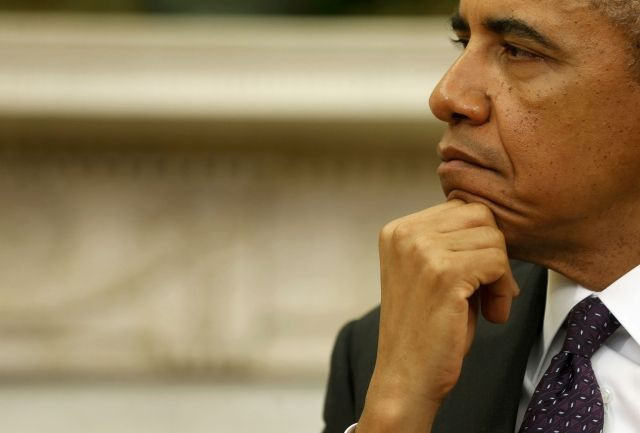
In his remarks this morning before the Senate moved to pass the immigration reform bill to debate in the Senate, President Barack Obama repeated his calls for the legislative body to heed calls to action on what he described as a "common-sense, bipartisan bill" which represents "the best chance we've had in years to fix our broken immigration system." The president sought to present the reform's main tenets as tough-minded but pragmatic measures that would "modernize" the country's immigration system.
1. It provides for an unprecedented beefing-up of border surveillance and apprehension of those who try to cross it.
He made reference to the $6.5 billion it would set aside for the Department of Homeland Security -- including technology like drone planes lent from the Department of Defense - in calling it "the biggest commitment to border security in our nation's history." He added that it would strengthen internal immigration law enforcement through an electronic employee verification system.
Obama took pains to emphasize his administration's efforts in an area on which he has been frequently criticized by Republicans, despite the record 400,000 deportations carried out under his watch in 2012. According to the Christian Science Monitor, 55 percent of the 2012 deportations were of convicted criminals.
"We focused our enforcement efforts on criminals who are here illegally and who are endangering our communities," said Obama. "And today, deportation of criminals is at its highest level ever."
2. It extends an "arduous" path to citizenship to the estimated 11 million undocumented immigrants in the country.
Obama pointed to the 13 years it would take most undocumented to become eligible to apply for citizenship in emphasizing the measure's toughness, saying, "This is no cakewalk."
The president was introduced by Tolu Olubunmi, which the White House's blog described as "a DREAMer originally from Lagos, Nigeria who has lived in the United States since age 14" and who "exemplifies the very core of why common-sense immigration reform is so critical." "Throughout her life," the blog added, "Tolu has shown exceptional promise, earning high school honors and graduating at the top of her class from a prestigious university with a chemistry and engineering degree."
Obama made reference to Olubunmi and another DREAMer in the audience, Diego Sanchez, in denouncing the House's recent vote which shot down an executive order granting deferrals on removal procedures to many young undocumented people who were brought to the United States as children. The president called the House's move an "extreme step" which "[asks] law enforcement to treat [DREAMers] the same way they treat violent criminals".
3. It makes it easier for "high-skilled" workers from abroad to come work in America.
"Alongside training American workers for the jobs of tomorrow," the president said, "we're also attracting the highly skilled entrepreneurs and engineers from around the world who will ultimately grow our economy."
© 2025 Latin Times. All rights reserved. Do not reproduce without permission.




